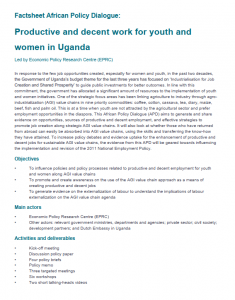
A lot of activitiy is ongoing in the APD ‘Assessing opportunities for productive and decent employment and effective strategies to promote job creation in strategic agro-industrial value chains in Uganda‘, led by the Economic Policy Research Centre (EPRC). Below, you can find a summary of recent outputs from this APD.
A policy brief assesses the ‘Implications of the COVID-19 pandemic on employment prospects for Uganda’s youth in the Middle East‘. The messages from this report were highlighted in a newspaper article ‘COVID-19 shut out externalisation of labour for Uganda citizens‘:
‘The containment measures adopted in the main destinations, e.g. Saudi Arabia, as well as those adopted in Uganda, limit international travel, thus raising concerns on whether increasing employment opportunities through labour exports, is still a viable source of employment for the youth… Covid-19 has not only threatened the job security of migrant workers, but also their salaries and the level of remittances, which consequently affects the welfare of their families back home… The World Bank projects that if this economic downturn persists, a sharp decline in the demand of migrant workers is inevitable and it could result in a rethinking of migration regulations governing work visas.’
The APD produced two further reports on ‘The role of labour externalisation in fostering sustainable Agro-Industrial value chains in Uganda‘ and ‘The value addition of fish in Uganda‘. The videos below share the outcomes of the dialogues linked to each of these reports.
The role of labour externalisation in fostering sustainable Agro-Industrial value chains in Uganda Dialogue
Please accept marketing-cookies to watch this video.
Due to few decent wage employment opportunities in Uganda, young people take up vulnerable jobs and are compelled to seek for employment opportunities in the Middle East. The government of Uganda has streamlined labour export by facilitating registration of over 100 labour agencies, fast tracking verification of jobs abroad and plans to revise of the 2011 National Employment Policy. Labour externalisation is beneficial in terms of skills development, remittances and investments back home. These benefits can be enhanced by developing channels for workers abroad to invest back at home, strengthening pre-departure training and orientation to prepare those heading abroad for jobs, facilitating the formation of associations for migrant workers to pool together their resources, emphasising on skills acquisition that migrant workers can apply at home upon their return. [Read full report here]
Dialogue on the value addition of fish in Uganda
Please accept marketing-cookies to watch this video.
Fish can promote agro-industrialisation due to its positive trade balance, many opportunities for value addition and backward and forward linkages with other chains. However, there is limited value addition along the fish value chains due to lack of processing facilities, inadequate capital and skills. Strategies to spur agro-industrialisation along fish value chains include training of youth on fish farming techniques, value addition, marketing and managing fish by-products; using different techniques to promote value addition for each fish species; organizing fish maws traders into associations; and developing regulations to streamline and license fish maw businesses. [Read full report here]


